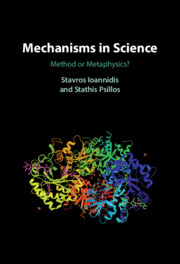Refine search
Actions for selected content:
5 results
Chapter 4 - Mechanisms as Causal Pathways
- from Part II - Causation and Mechanism
-
- Book:
- Mechanisms in Science
- Published online:
- 09 June 2022
- Print publication:
- 23 June 2022, pp 90-117
-
- Chapter
- Export citation
Introduction
-
- Book:
- Mechanisms in Science
- Published online:
- 09 June 2022
- Print publication:
- 23 June 2022, pp 1-12
-
- Chapter
- Export citation
Chapter 6 - Against Activities
- from Part II - Causation and Mechanism
-
- Book:
- Mechanisms in Science
- Published online:
- 09 June 2022
- Print publication:
- 23 June 2022, pp 138-163
-
- Chapter
- Export citation

Mechanisms in Science
- Method or Metaphysics?
-
- Published online:
- 09 June 2022
- Print publication:
- 23 June 2022
Introduction
-
- Book:
- Mental Causation
- Published online:
- 09 December 2019
- Print publication:
- 19 December 2019, pp 1-12
-
- Chapter
-
- You have access
- Open access
- HTML
- Export citation
